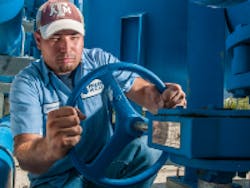WaterWorld Weekly Newscast, November 21, 2016
The following is a transcript of the WaterWorld Weekly Newscast for November 21, 2016.
Hi, I'm Angela Godwin for WaterWorld magazine, bringing you water and wastewater news headlines for the week of November 21. Coming up...
NRWA announces water, wastewater apprenticeship program
EPA amends emergency order on Flint drinking water
Brewing company to use Cambrian technology to manage wastewater
Spain in hot water with European Commission
Last week, the National Rural Water Association announced the creation of the NRWA Workforce Advancement Center, which will develop the WaterPro Apprenticeship Program, a nationally recognized standard that will be registered with the U.S. Department of Labor.
[soundbite - Matthew Holmes, Deputy CEO, NRWA]
"It will be nationwide and it will actually be open to any person in the water wastewater industry or system that wants to sign up to receive an apprentice so they can participate in an earn while you learn model of Workforce Development."
The Department of Labor will be providing technical assistance to the association as it develops its program.
[soundbite - David Gaither, Regional Executive Assistant, Office of Apprenticeship, U.S. Department of Labor]
"We're offering through the Registered Apprenticeship program to make this a nationally recognized program and when they complete the process, the individuals that finish will receive a certificate of training as a journeyman water treatment operator, wastewater treatment operator, that is nationally recognized.
"Most of these certificates are also worthy of articulation for college credits and going to a registered apprenticeship program also allows veterans to utilize their GI Bill benefits."
The creation of the WaterPro Apprenticeship Program will help address the need for increased skills and training in light of advancements in water treatment and supply technologies.
It will also help the industry attract new talent as it prepares to lose a significant portion of its workforce to retirement over the next few years.
[soundbite - Robert Moore, General Manager, Marshall County Water Corporation (Okla.)]
"It would be very beneficial to have internship program bring in new hires and be able to get them trained in the proper techniques and with the new regulations and the up-to-date technology that we have today. It's different than it was, and even when I was trained, things are so much different now, you know. It's ... a training program like this would really help."
NRWA said it will take some time to develop the standards necessary to support the apprenticeship program, but over the next year, the organization plans to work directly with state associations to gather input.
For more information, please visit nrwa.org.
Last week, the U.S. EPA announced an amendment to update its January 2016 Safe Drinking Water Act emergency order to the state of Michigan, the Michigan Department of Environmental Quality and the city of Flint.
The amended order provides additional details for system upgrades necessary to provide safe and reliable drinking water to Flint residents, specifically to:
- finish construction on the new pipeline connecting the current water treatment plant to the new source water;
- effectively treat new source water for at least three months
and
- demonstrate compliance with the federal Safe Drinking Water Act, including requirements for corrosion control treatment and water quality monitoring.
All other requirements in the January 2016 order remain in effect.
To see the amended order, visit epa.gov/flint.
With an eye toward proactively managing its wastewater, Sonoma County brewer Russian River Brewing Company will be the first to install Cambrian Innovation’s EcoVolt MBR as a standalone solution.
Commercially launched in 2015, the EcoVolt MBR is a modular aerobic digester that removes 99 percent of contaminants from industrial wastewater.
It's fully automated and generates continuous feedback on system performance, enabling real-time control and minimizing operator oversight.
The system can be used independently or in conjunction with Cambrian’s EcoVolt Reactor for energy-efficient wastewater treatment and water reuse.
The sustainability-minded owners of Russian River say the EcoVolt solution will cut their carbon and water footprints, and will lay the groundwork for future water reuse.
In international news, the European Commission said last week that Spain's failure to treat wastewater in 17 cities and towns should result in a fine, and it's asking the court to levy a nearly $50 million penalty.
The problem stems back to 2011, when a judge ruled Spain had broken EU law by not adequately collecting and treating wastewater in 37 cities and towns.
These last 17 -- which comprise some 1.4 million people -- are still out of compliance.
In addition to the $50 million penalty, the European Commission also proposing a daily $180K fine until the problem is resolved.
For WaterWorld magazine, I'm Angela Godwin. Thanks for watching.
